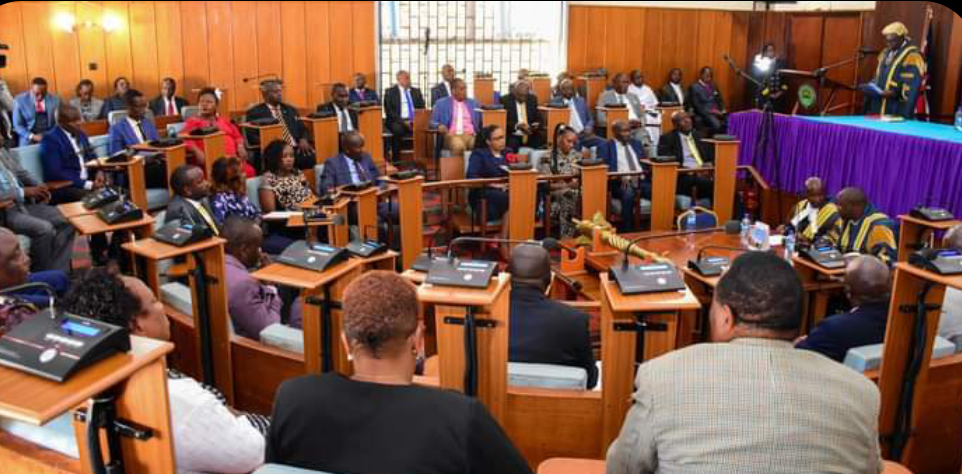A Presidential task force has raised concern over the use of aged and obsolete equipment by the Government Press.
The task force has further disclosed that national and county governments cumulatively lose Sh70 billion yearly outsourcing printing services that could have otherwise been done by Government Press.
The Vice chairman of the Taskforce on Modernization and Transformation of the Government Press Mr Nzomo Mbithuka said more than 70 percent of the printing machines in use were acquired between 1930 and 1980.
“This has led to obsolescence with frequent breakdowns and hence high maintenance costs, and difficulty in sourcing for spare parts for maintenance of the otherwise outdated machines,” stated Mr Mbithuka.
He said the use of aged equipment has increased production costs and hence reduced its competitive advantage in the industry.
The Government Press prints for Ministries, Departments, and Agencies of government and the general public.
Speaking at the Regional Ccommissioner’s plenary hall in Nakuru during the public participation forum for Nyandarua, Kericho, Nakuru, and Bomet counties, the vice chairman noted that a lot of potential revenue is lost when official documents, examination papers, LPOs, receipts, and many other papers are not printed at Government Press.
“We need to invest in modern technologies and new equipment to sort out the challenges. Unless we upgrade the government press, ministries will experience a shortage of crucial documents such as title deeds, death certificates, and marriage certificates among others,”
He noted that machines, being a century old, break down more often and that it was more cost-effective to buy new printing machines than repair those that have broken down.
He said there was an urgent need for the Government Press to use more efficient and highly performing machines.
The Vice chairman indicated that under the review, the government press will be diversifying its menu and defining its business lines, among them being gazette services, digital printing services, security printing services, and commercial printing services.
The government press he said, will ensure that these services are delivered cost-effectively and are of high quality adding the intention was to change the government press from being a resource consumer to a resource generator.
In a gazette notice dated June 23, 2023, President William Ruto appointed the task force focused on modernizing and transforming the Government Press into an efficient and commercially viable entity.
Chief of Staff and Head of Public Service Felix Koskei named Dr. Narendra Raval as the chairperson of the Steering Committee tasked with overseeing reforms at the Government Press.
The objective, he said, is “to enhance the overall capacity, efficiency, effectiveness, security, viability, and sustainability of the Government Press”.
Members of the task force are Government Press Chief Executive Officer Abdi Hassan Ali, Mukami Maina, Victor Lomaria, Ruth Murage, Christopher Kirigua, and Patel Kiritkumar
Nakuru County Commissioner Loyford Kibaara noted that there has been a significant advancement in the methods, technology, and infrastructure for the production, standardization, dissemination, cataloging, and safeguarding of national documents.
Mr Kibaara indicated that apart from costs incurred to repair the machines, their inefficiency and obsolesce could be hindering service delivery.
Since its establishment in 1895, there have been various unsuccessful attempts by the various administrations to modernize and transform the Government Press.
Mr Kibaara said the government’s plan to strengthen the mandate of the press by making it the official printer and publisher of the government as well as an advisor to the state on all matters of printing and publishing would be revolutionary if implemented.
The Government Press Chief Executive Officer Mr Ali said there was a need to review their service to set the cost of printing at market rates. The CEO observed that the Government Press was grossly underfunded.
The Press prints documents such as budgets, Economic Surveys, Acts of Parliament and Gazette Notices.
It sells Controller of Budget and Auditor-General reports at Sh5,000 per volume, an Act of Parliament at Sh110, and Commissions of Inquiry reports at Sh 1,800.
It is the designated printer of all security-related documents, including title deeds, log books, birth and death certificates, and revenue stamps.
The CEO stated that the Press prints for the Ministry of Lands, the Civil Registration Department, the National Transport Safety Authority, and the Kenya National Bureau of Statistics among others at subsidized rates.
However, it does not charge the National Assembly and the Senate as well as the Treasury for printing documents.
“We can’t break even and we need to review the charges, make it financially independent, and get a modern printing press. This will also raise the cost of purchasing government documents such as budgets, Economic Surveys, and Acts of Parliament among others by private individuals,”
A member of the task force Mr Ian Chelal said the government press if revamped has the potential of capturing a significant portion of the estimated Sh.518 billion in printing and publishing market services, which is growing at between 6 to 10% per annum.
He said the government is spending huge resources in foreign exchange to print security documents, among them Kenya National (KNEC) Examinations outside the country, a trend he noted can end if the press is revitalized and modernized.
Under the proposed structure, a comprehensive government publications library is to be established as the primary source of all current and historical government documents
Further, the government press will establish a land-based and online (virtual) national printing and publishing museum, providing insights into the evolution and history of printing and publishing, including saving and preserving the existing printing equipment and other materials of historical significance.
The State Corporation is expected to have a board and lean, flat management. It will also involve the rollout of a well-structured joint venture with a reputable global security printing entity for high-end security press, with the implementation of this process expected to cost an estimated Sh18 billion.


